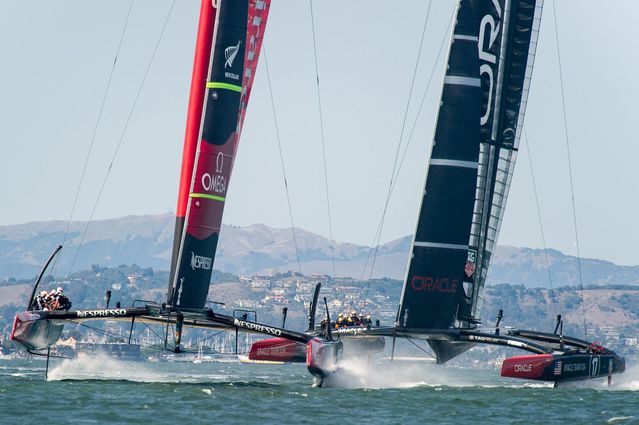Sport and Competition
David and Goliath: When Sports Inspire National Pride
A story for modern times
Posted June 26, 2017

Why do we love the David and Golliath story? The Biblical tale goes something like this: Three thousand years ago the Israelites and Philistines were in a combat situation where the two armies could not fight without massive loss, so each side sent in one man to fight on their behalves. The Philistines sent in a giant of a man in full armour by name of Goliath, and this put a great fear into the Israelites as they had no man bigger and stronger than Goliath. Then a shepherd by name of David volunteered and thinking he was mad but what else was on offer, the Israelites let him have a go, certain he would be slayen instantly. He had no armour and only a sling and a handful of stones. He fired his first stone before he got near enough to Goliath for the giant to slay him, and bullseye, hit him between the eyes, and down Goliath fell.
Of course there are all sorts of biblical meanings given to this, and in modern times medical analyses suggest that Goliath the giant suffered from acromegaly, a disorder that results from excess growth hormone. It is typically a result of a benign pituitary tumor, causing excess of this hormone to be produced. It can lead to adults reaching heights of eight or more feet, and one of the common side effects is poor vision. So perhaps Goliath couldn’t see very well, and David’s quick and very deadly sling shot from a distance was therefore extremely effective.
In today’s world of course, the phrase ‘David and Goliath’ denotes a situation where the ‘underdog’ or smaller player beats a bigger, stronger, opponent.
I live in a small country of 4.5 million people at the bottom of the world (or the top of the world if viewed from the other end!) and when we do well at something compared with other much larger, wealthier and more ‘powerful’ countries, it is often couched in ‘David and Goliath’ terms. We ‘pitch above our weight’ in a few areas from time to time, including, of note, being the first to bring in votes for women, being the first country to go Nuclear Free (which is still the case in NZ), and in the sporting arena in a few sports holding our own or winning against the Goliaths of the world like the US and UK (and in NZ’s eyes, that Goliath which is our closest sporting rival, Australia!) Rugby is our ‘National sport’ and for other rugby-mad countries such as South Africa, Australia, and the UK, NZ’s famous team, the All Blacks, remain iconic. Right now they are ‘thrashing’ the UK and Ireland team in a series of test matches.
Over the last few weeks NZ has been in thrall to the America’s Cup, and today won it for the third time in its very long history, beating America and its giant power. Power in this context is MONEY, which the American team Oracle (bank-rolled by multi-billionaire Larry Ellison of Oracle) has in spades, and of course their ability to get some of the top people in the world on their design teams and in their sailing crews. Amusingly, in recent years the America’s Cup US team has been composed of more non-Americans than Americans, with their current team Oracle, mostly Australians (who don’t have a team of their own as they don’t want to risk being beaten by New Zealand!) The first two America’s Cup events Oracle sailed in and won had, as their CEO, New Zealander Sir Russell Coutts, who had shown his ability by winning the cup for NZ and later Switzerland and the US. The New Zealand team, Emirates NZ, on the other hand has mostly New Zealanders on their team (although from its name it is clear that its main financial sponsor is not a Kiwi!). Many of the America’s Cup boats from many countries are now designed and built in NZ, which has proven to be the best developer and builder of these flying, high-tech boats. (Click for Youtube video of those flying boats!)
Why is the America’s Cup such a prize? It is the oldest sporting trophy in the world, known affectionately as ‘the Auld Mug’ and the first race was held in 1851. Over the last many years the Cup has been sailed only once every four years (so countries entering have time to raise enough money and develop their boats to new heights!). Since it began, only four nations can lay claim to having captured the cup: the US (every race from 1857 until it was first beaten in 1983), Australia (once, in 1983), Switzerland (once in 2003) and New Zealand (three times in 1995, 2000 and 2017—Good on ya mate or Woo Hoo as is said in the US!).
According to that Goliath of Information, Wikipedia, the magnificent cup “was originally awarded in 1851 by the Royal Yacht Squadron for a race around the Isle of Wight in England, which was won by the schooner ‘America.’ The trophy was renamed the America's Cup after the yacht, and was donated to the New York Yacht Club (NYYC) under the terms of the ‘Deed of Gift’ which made the cup available for perpetual international competition. Any yacht club that meets the requirements specified in the deed of gift has the right to challenge the yacht club that holds the cup. If the challenging club wins the match, it gains stewardship of the cup. The history and prestige associated with the America's Cup attracts not only the world's top sailors and yacht designers but also the involvement of wealthy entrepreneurs and sponsors. It is a test not only of sailing skill and boat and sail design, but also of fundraising and management skills. The trophy was held by the NYYC from 1857 (when the syndicate that won the cup donated the trophy to the club) until 1983 when the cup was won by the Royal Perth Yacht Club, represented by the yacht ‘Australia II’, ending the longest winning streak in the history of sport."
Over the years the rules and format have changed many times and the boats have become more like flying machines. The many countries and boats entering, race first to find a ‘Challenger’ and then that boat races the ‘Defender’— the boat that won the last Cup. Currently the final comprises a series of races where the boat that is the first to win seven races wins the Cup. The 2017 twin-hulled boats have to be watched racing to be believed. They fly through the water on thin foils powered hydraulically by people-power, either from grinders (sailors using their arms), or in NZ’s latest winning boat, by men riding bikes!
When a country is winning, National pride soars, happiness scores soar, confidence soars, and this is amplified in a small country like NZ. David and Goliath. National pride in relation to art or sports or forward-thinking environmental policies or humanitarian policies is not a bad thing. It even has economic benefits of course.
There is another important aspect to the David and Goliath story; how likeable each combatant is. Most people like David best. It is rumored that in Bermuda where this year’s America’s Cup races were held, the popular team has always been NZ, even amongst many Americans, not because, at the beginning, their boat had any more likelihood of winning than the American boat, but because the NZ sailors and team generally came across as laid-back, modest, and generally nice fellows. (In stark contrast to certain of the America’s Cup sailors, especially the helmsman—nicknamed ‘Pitbull’—who is famously Australian!) (Watch an insightful Youtube interview about the personalities of the competing sailors here.)
But here is my point (other than a tiny, or perhaps mighty cheer for NZ...) We can all use the David and Goliath story to give us inspiration in whatever we seek to do. Money often helps, no doubt about it, but hard work, skill, persistence, humor, an ability to learn from our mistakes and losses, and a quiet confidence are much more important. (Plus a little humility, forgive my hopefully temporary lapse…) For most of us, to do well because of our own efforts and not because we were born into money and privilege is so much more satisfying.




